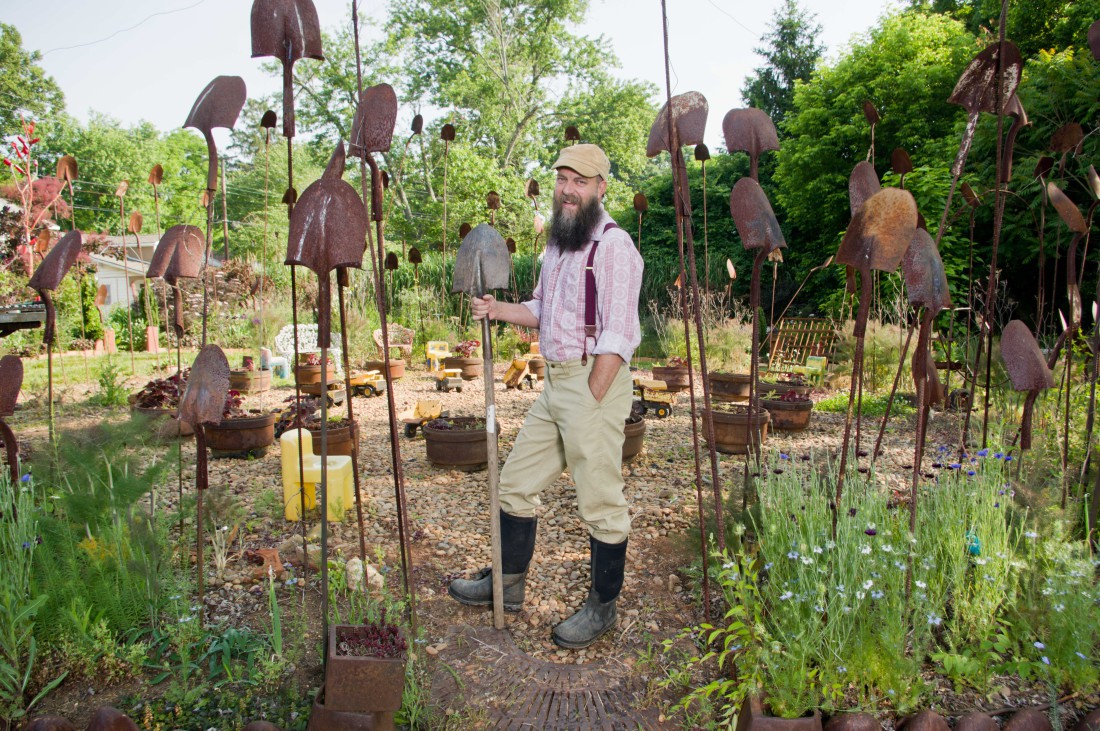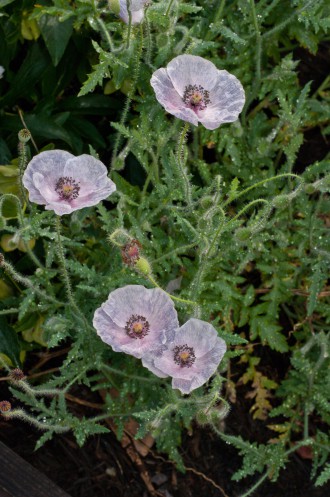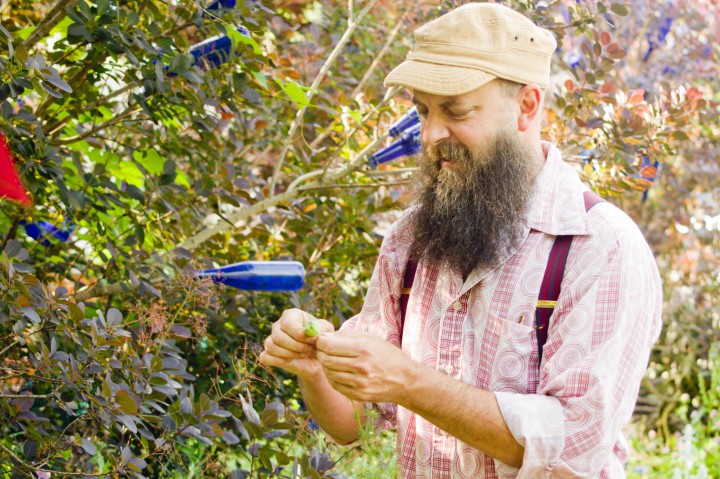by Bill Torgerson
Christopher’s garden sits down the hill from Harvest Records and across from the Appalachia School of Holistic Herbalism in West Asheville. Flanked by two tall hedges, the garden fills the diamond-shaped space at the corner of Waynesville Avenue and Westwood Place. With hundreds of shovel blades perched on lengths of rebar poking up into the air, it’s an eye-catching enclave that often draws locals and visitors alike.
The man behind the garden is 49-year-old Christopher Mello, an artist who works with clay and steel. He’s spent much of the last 13 years pulling weeds and developing a poppy hybrid he calls “Blue Pearl.” During most of that time, Mello made a living, as he jokingly explains, “gardening for the rich and famous of Asheville.” He’s now part of a team of ice cream makers at The Hop.
Mello, who earned a two-year associate degree in horticulture from Haywood Community College, says he once read a book by acclaimed British gardener Christopher Lloyd, who declared that green is every garden’s base note. But Mello took this as a challenge: He wanted to start with a dark color wash, to create the kind of place where Morticia of The Addams Family might feel at home. The resulting darkly beautiful space is inhabited by Japanese maple, redbud, black birch and smoke trees, which flourish alongside bachelor’s button, Palace Purple coral bells and elderberry shrubs.
I first met Mello when I’d lived in Asheville for less than two weeks and was participating in The 48 Hour Film Project. This whirlwind affair plays out over Father’s Day weekend: Teams draw a genre out of a hat and have until late Sunday afternoon to produce a short film. I’d used Twitter to recruit a teammate named Barbie Angell, who described herself as a demented pixie fairy and poet. She said she knew a guy with a magical place who might let us use it as a setting for our movie.
Less than an hour later, I was standing in the garden and shaking his hand. Mello has what I’d call a Whitman beard, and together with his shaved head, it can make him seem intimidating. As soon as I started talking with him, however, any sense of gruffness quickly dissipated.
A generous man and a talented artist, Mello is smart about plants and devoted to creating a community space where people can relax and find peace amid their busy lives. He previously rented space at Curve Studios in the River Arts District, where he also kept a garden. Feeling it was time to buy property, however, he joined forces with some metalworkers and ceramicists in 2005 to purchase property in West Asheville. The group’s primary interest was an auto repair and customization shop called Charlie’s Street Rods, which they transformed into a shared studio. But Mello saw the adjacent vacant lot as the potential successor to his RAD garden.
To offset the dark palette and the skulls tucked into the branches of trees and shrubs, Mello crafted a makeshift chalkboard out of steel painted black on one side. It often rests against a rock near the Westwood Place entrance, displaying the following message: “Yes You May.”
Heading for the center
“I must have been feeling patriotic that day,” he says, laughing about his use of red and blue chalk. “When people drive by the garden or have walked by a bunch of different times, when they finally really stick their heads inside the entrance and they’re looking around and thinking, ‘Is this private? Is this OK? Can we come in here?’ then they see a sign that says, ‘Yes You May.’”
While Mello intended the message as literal permission to enter his garden, many visitors have said they’ve adopted the phrase as a kind of mantra, a way of giving themselves permission to realize some long-deferred dream. I imagine them finally following through on their desire to hike the Appalachian Trail, take a trip to Europe before they’re too old to get around, or paint the purple mountains at sunset.
During my own visits to the garden, whether working on a documentary film or taking an after-dinner family walk, I’ve met quite a few musicians, a Burning Man aficionado, a friend who wanted to talk relationships, an artist who needed help loading her steel creation into her van, a photographer, a television production kind of person and a family that was there for the first time. One of the children headed straight for the center, clutching an ice cream cone.
“When kids come into the garden,” notes Mello, “the first thing that appeals to them is the Tonka trucks.” About 15 of them are lined up on a bed of rocks. “It’s been a mixed blessing. I’ve watched a lot of kids grow up from moving through the garden in mama’s belly to now being 10-year-olds who I can actually talk to about plants. If the only people who came here were gardeners asking gardening questions, I probably wouldn’t be as social as I am. I like to tell people I’m the most socialized hermit in all of Asheville. I don’t get out, but people come here all the time. I see tons of people, but I never go anywhere.”
Sacred space
For those who look closely, the garden contains many treasures. I find a large ceramic flue liner tucked back on one of the little paths lined with larkspur and bronze fennel. Like the chalkboard, it carries a message, though Mello didn’t write this one: “Do not tell me of things you will do, but tell me of the things you feel now.” It hints at some of what goes on in the garden that its creator doesn’t necessarily know about. “In the 10 years I’ve been here,” he explains, “I’ve met strangers who said: ‘Man, I almost broke up with my girlfriend on that bench. We were here until 4 o’clock in the morning.’ Whether the outcome was good or bad, people come here to…”
His words trail off as Mello peers up into the air behind me, as if the last half of his observation might be printed somewhere there among the shovel blades or hovering over the love-in-a-mist and bachelor’s buttons. I try to think what it is that’s compelled me to spend so much time in the garden myself.
“Church is not the right word,” says Mello. “The garden is a physical, maybe even sacred, space to decompress. That’s completely unintentional, but I’m really grateful for it. I get that, too. I get the wash of other people’s coming here to be at ease. I definitely benefit from whatever energy’s left over from that.”
Five years ago, Mello’s 84-year-old father was involved in a moped accident while driving to the senior center where he liked to spend time, and he lost a leg. “My home is two minutes from the garden,” says Mello. “I’m very close to where I was born. I decided I would take on taking care of my father as a full-time job.” With no help from nurses, he looked after his father at home and drove him to doctors’ appointments. But when he wasn’t with his dad, he was in the garden.
“That was what completely got me through the process of grieving over his accident and, eventually, grieving over his slow and peaceful passing,” Mello explains. As we talk, he’s seated on a yellow stool underneath the blue bottle tree. (It’s not just that there are blue bottles stuck on the ends of branches: Every inch of the tree has actually been painted blue.) Crossing his arms over his legs, Mello looks away from me.
“The day my father died, I came here and planted a shrub. I was much more ready to move on, and much better equipped to deal with his passing, than if I’d been working a job and taking care of him, especially if it was a job that was a source of stress. I might have the same kinds of problems other people have, but because I spend the vast majority of my days in this space, I’m able to work through my problems and deal with issues more easily than just about anyone else I know. I really count myself lucky that way.”
A meditative ripple
I ask Mello if there’s anything else about his garden that he wants me to know.
He reaches into the mass of his beard to scratch his chin and once again looks skyward, seeking answers. “You’ll have to edit this really carefully,” he finally says, “to not make me sound like a total New Age hippie, but yeah, I got this thing to say about a meditation we did when we started.”
When the garden was brand-new, Mello tells me, he sat with a group of people in what felt like the very center of the lot. The group wanted to do an invocation to see what energy was present and what they could summon there.
“I’m not typically a meditation guy, and I’m not one to have visions materialize,” he says; somewhere close by, a bird starts singing loudly, as if testifying to the truth of those words. “I received a vision of an immense, 10,000-gallon drop of honey coming out of the sky and landing right where we were and hitting the ground slowly — like honey, not water — rippling and reverberating away.”
Mello believes the vision inspired both the circular shovel garden and the idea of a perfect circle as the governing principle.
“I see the garden as if from space, like an eyeball on the face of the planet,” he explains. “So many people come here to relax and breathe and take in a tiny little chunk of nature in the middle of the city. The garden has become a meditative ripple that hits the ground and plays out and comes back. It feeds me, and it feeds the people that use the garden. I’m really grateful that the initial vision of the immense drop of honey came down and has continued to inspire me today.”
Editor’s note: The documentary Yes You May: The Story of Christopher’s Garden, by William Torgerson, will be screened at the Grail Moviehouse (45 S. French Broad Ave.) on July 2, at noon. Admission is free.






I just LOVE this garden and take a stroll through whenever I’m in the area.
Thank you, Christopher, for your generous heart and kind spirit!